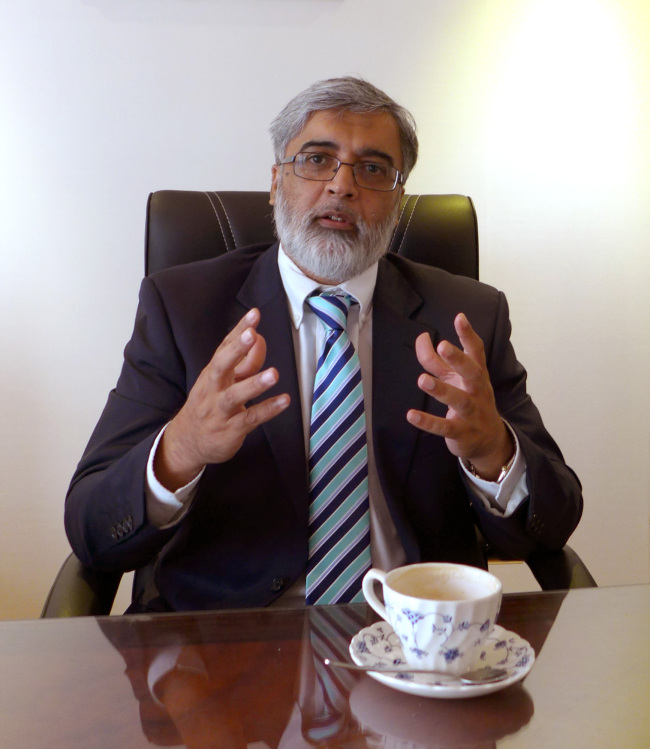Pakistan marks independence with eye on global affairs
By Korea HeraldPublished : Aug. 17, 2015 - 18:31
Pakistan celebrated its national independence on Aug. 14 amid concerted efforts to eradicate terrorism and engage in global trade, Pakistani Ambassador Zahid Nasrullah Khan said last week.
The Independence Day of Pakistan, which falls a day before India’s Aug. 15 Independence Day, is a commemoration of the country’s founding originating from the end of the British Raj in 1947.
After a 40-year independence struggle, colonial India was separated into India, East Pakistan and West Pakistan, with East Pakistan seceding to form Bangladesh in December 1971.
Fears that the Muslims would not inherit their rights to Islamic ways of life in independent India, after a series of failed constitutional arrangements with Hindus, led to Pakistan’s birth as a new nation.
The Independence Day of Pakistan, which falls a day before India’s Aug. 15 Independence Day, is a commemoration of the country’s founding originating from the end of the British Raj in 1947.
After a 40-year independence struggle, colonial India was separated into India, East Pakistan and West Pakistan, with East Pakistan seceding to form Bangladesh in December 1971.
Fears that the Muslims would not inherit their rights to Islamic ways of life in independent India, after a series of failed constitutional arrangements with Hindus, led to Pakistan’s birth as a new nation.

“Our Independence Day is a very important event for the 200 million Pakistanis. We celebrate our constitutional struggle with a great fanfare through flag-raising ceremonies, parades, cultural events and playing of patriotic songs,” Khan told The Korea Herald.
“Our Prime Minister hoists our national flag publicly and makes a speech to the people, civil servants and the diplomatic corps, recounting the government’s achievement and agenda ahead based on focus areas.”
The Pakistani prime minister is the head of government, while the president is the head of state symbolizing national unity. The prime minister is elected by the people, and the president is elected by four provincial assemblies and the national assembly.
The spirit of the constitution remains Islam to promote its laws, values and principles, and stipulates the prime minister and president be Muslim, explained the ambassador. Pakistani Muslims are predominantly Sunnis with Shiite minorities.
The country also legally guarantees minority rights and religious freedom, which are represented by the white strip on the national flag.
Khan, who is halfway into his post in Korea, said Muslims in Korea across different denominations appreciate their religious freedom and pray at the Seoul Central Mosque in Itaewon.
On Pakistan’s foreign relations, “Since coming into power in June 2013, our Prime Minister Nawaz Sharif set a clear agenda of a ‘Peaceful Neighborhood Policy’ to reap the dividends in regional stability, security and prosperity,” Khan stressed.
“This foreign policy calls for resolving all outstanding issues between Pakistan and India, principally the resolution of territorial disputes in the Jammu and Kashmir region north of India, currently on the United Nations Security Council agenda.”
Tension is high in the heavily fortified Himalayan region of Jammu and Kashmir, where China, India and Pakistan all have territorial claims. India and Pakistan traded heavy gunfire and mortar rounds for seven straight days through Sunday, killing and wounding several people.
On Pakistan-Korea relations, Khan added, Sharif is committed to boosting bilateral trade and investment ― $1.2 billion last year ― as the two countries are seeking to launch a full-scale free trade agreement in future.
Former Korean Prime Minister Chung Hong-won visited Islamabad in April last year, and Pakistani Federal Minister for Commerce Khurram Dastgir Kahn visited Korea in early July to participate in the first annual meeting of the Pakistan-Korea Joint Trade Commission.
The leaders agreed to complete an FTA feasibility study by June next year, and a joint trade committee is scheduled to meet in 2017, the ambassador said, adding that a trade conference will be held early next year in Pakistan for Korean businessmen.
Pakistan exports textiles, leather and metal to Korea, all of which are subject to World Trade Organization tariffs despite high quality, Khan noted. Korean exports to Pakistan ― mainly electronic appliances, machinery, steel, petrochemicals and synthetic rubber ― have dropped in recent years due to the China-Pakistan free trade agreement that came into force in July 2007, which brought price-competitive Chinese products.
To counter the export decline, Korea Trade Promotion Corporation has advised launching an FTA with Pakistan, noting the country’s young and cheap workforce taking up half the population and growing demand for infrastructure construction and information technology products.
The Pakistani embassy is also actively pursuing Korean Air to start direct flights to the country’s major cities of Islamabad, Karachi and Lahore, as flights currently go through Thailand, the United Arab Emirates and Qatar.
Due to security concerns, major international airlines have stopped flying to Pakistan, particularly since the invasion of Afghanistan by the U.S. Forces in 2001.
Khan said his government has taken full-scale military operations to wipe out the Taliban terrorists who were responsible for massacring 145 people, mostly children, in a school in the northwestern city of Peshawar on December 16 last year.
“Before the incident, the public opinion was divided toward the Taliban, which tried to destabilize Pakistan and overthrow our government for a global jihad,” he said. “However, following the heinous massacre, a total consensus emerged across all ethnic and religious groups in our country to annihilate these cold-blooded killers.”
A national antiterrorism bill was enacted, special military course was set up and hate-preaching mosques and religious organizations were dismantled, according to the ambassador.
The blanket operation “Strong Blow,” combining air strikes, artillery and counterinsurgency on the ground, was launched, using 100,000 soldiers to comb through Taliban hideouts in the northern area adjacent to the Afghan border. The Pakistani military says more than 2,800 militants have been killed since launching the latest offensive.
By Joel Lee (joel@heraldcorp.com)
-
Articles by Korea Herald







![[Hello India] Hyundai Motor vows to boost 'clean mobility' in India](http://res.heraldm.com/phpwas/restmb_idxmake.php?idx=644&simg=/content/image/2024/04/25/20240425050672_0.jpg&u=)











